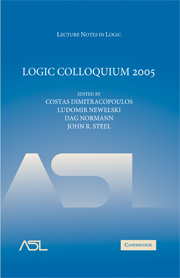Book contents
- Frontmatter
- Contents
- Introduction
- Speakers and Titles
- Thread algebra and risk assessment services
- Covering definable manifolds by open definable subsets
- Isomorphisms and definable relations on computable models
- Independence for types in algebraically closed valued fields
- Simple groups of finite Morley rank
- Towards a logic of type-free modality and truth
- Structural analysis of Aronszajn trees
- Proof analysis in non-classical logics
- Paul Bernays' later philosophy of mathematics
- Proofnets for S5: Sequents and circuits for modal logic
- Recursion on the partial continuous functionals
- A transactional approach to the logic of truth
- On some problems in computable topology
- Monotone inductive definitions and consistency of New Foundations
- LECTURE NOTES IN LOGIC
A transactional approach to the logic of truth
Published online by Cambridge University Press: 18 December 2009
- Frontmatter
- Contents
- Introduction
- Speakers and Titles
- Thread algebra and risk assessment services
- Covering definable manifolds by open definable subsets
- Isomorphisms and definable relations on computable models
- Independence for types in algebraically closed valued fields
- Simple groups of finite Morley rank
- Towards a logic of type-free modality and truth
- Structural analysis of Aronszajn trees
- Proof analysis in non-classical logics
- Paul Bernays' later philosophy of mathematics
- Proofnets for S5: Sequents and circuits for modal logic
- Recursion on the partial continuous functionals
- A transactional approach to the logic of truth
- On some problems in computable topology
- Monotone inductive definitions and consistency of New Foundations
- LECTURE NOTES IN LOGIC
Summary
Abstract. We survey and evaluate recent discussions about axiomatic theories of truth, with special attention to deflationary approaches. Then we propose a new account of the use of truth theories, called a transactional analysis. In this analysis, information is communicated between intelligent agents, which are modeled as individual axiomatic theories. We note the need in the course of communication to distinguish whether or not new information is considered trustworthy.
τò μὲν γὰρ λέγειν τò ὂν μὴ εἶναι ἢ τò μὴ ὂν εἶναι ѱεῦδος, τò δὲ τò ὂν εἶναι ϰαὶ τò μὴ ὂν μὴ εἶναι ἀληϑές, ὥστε ϰαὶ ὁ λέγων εἶναι ἢ μὴ ἀληϑεύσει ἢ ψεύσεται
To say that what is is not, or that what is not is, is false; but to say that what is is, and what is not is not, is true; and therefore also he who says that a thing is or is not will say either what is true or what is false.
– Aristotle, Metaphysics, 1011bThis paper consists of three parts. First is a brief introduction; probably most of it will be very familiar material. Then I will describe and discuss some recent work on axiomatic theories of truth. Finally, I will suggest an alternative way of thinking about axiomatic theories of truth, which I call a transactional approach. The famous quotation from Aristotle (shown above, and chosen in honor of the conference at which this paper was presented) is not really the starting point, but includes one little feature which deserves attention for later reference: the use of the word “say”.
- Type
- Chapter
- Information
- Logic Colloquium 2005 , pp. 202 - 220Publisher: Cambridge University PressPrint publication year: 2007



